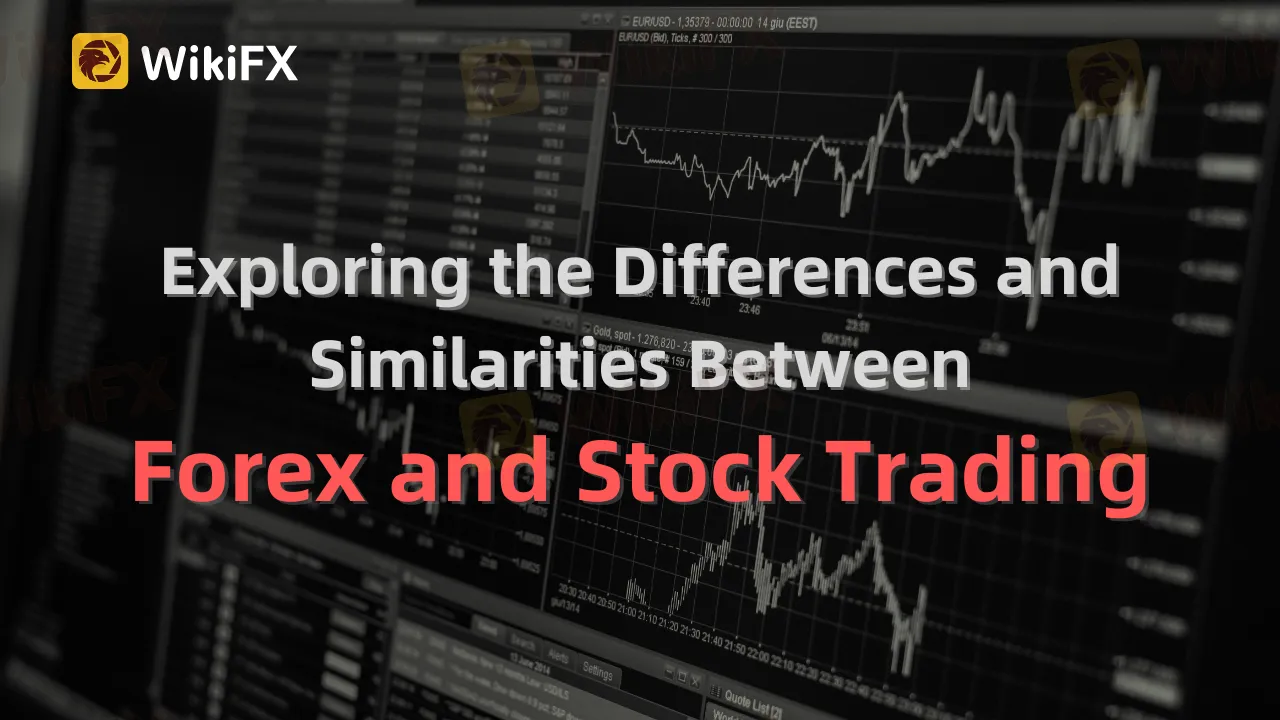简体中文
繁體中文
English
Pусский
日本語
ภาษาไทย
Tiếng Việt
Bahasa Indonesia
Español
हिन्दी
Filippiiniläinen
Français
Deutsch
Português
Türkçe
한국어
العربية
Exploring the Differences and Similarities Between Forex and Stock Trading
Abstract:Forex and stock trading have distinct differences, including their trading hours, level of leverage, and analysis methods. Trading forex offers high liquidity and a broad range of currency pairings but also high volatility. On the other hand, stock trading allows investors to invest in reputable businesses with a track record but may be impacted by political unpredictability and economic downturns. To succeed, traders should understand the market differences, employ suitable trading strategies, and manage risk properly. Trading emotions and financial calendars on WikiFX are useful resources for traders to stay informed of significant market events.

For investors trying to make money in the financial markets, forex and stock trading are two popular possibilities. While each market has distinct qualities of its own, determining which is more lucrative depends on a number of different variables. The differences between trading in forex and stocks, their benefits and drawbacks, their liquidity, their risk and reward profiles, the factors that affect prices, their trading strategies, their fees and commissions, the effects of global economic events on each market, which market is better suited for day trading, and common mistakes traders make and how to avoid them will all be covered in this article.
Key Differences Between Forex and Stocks Trading
In forex trading, currency pairs are bought and sold with the intention of profiting from fluctuations in exchange prices. Shares of businesses that are listed on stock exchanges are purchased and sold during stock trading. The open times of the two marketplaces constitute a significant distinction. While stock markets are only open during certain hours of the day, forex markets are open every day of the week, 24 hours a day.

The level of leverage that is accessible in each market is another important distinction. High leverage is often used in forex trading, enabling traders to handle large positions with very little cash. Leverage restrictions are often lower in stock trading.
Each market employs a different kind of analysis. While stock traders may place a greater emphasis on fundamental research, forex traders often employ technical analysis to spot trading opportunities.
Advantages and Disadvantages of Trading Forex Compared to Trading Stocks
The market's great liquidity is one benefit of trading FX. As a result, it is simple to instantly purchase and sell currency pairs without changing the market price. The variety of currency pairings accessible for trading on forex also provides a broad range of trading options.
The high amount of market volatility is one drawback of trading forex. Currency pairings may suffer rapid changes, which can cause traders who are not well-prepared to lose a lot of money.
The possibility to invest in reputable businesses with a track record is provided by stock trading. Additionally, it enables traders to take advantage of dividends and share buybacks. However, variables like political unpredictability, economic downturns, and changes in laws may have an impact on the stock market and cause big losses.
Higher Liquidity: Forex or Stocks?
The liquidity on the forex market is larger than on the stock market. This is due to the fact that the forex market is significantly bigger than the stock market, with daily trading volume exceeding $5 trillion as opposed to the stock market's $200 billion or so. The forex market also has a significant number of market players, including central banks, major enterprises, and individual traders, which contributes to its high liquidity.
Risk and Reward Profiles of Forex and Stock Trading
Trading in stocks and foreign exchange has different risk and return characteristics. Higher leverage is often used in forex trading, allowing traders to benefit more from very tiny price changes. If deals go against the trader, this also implies that losses might be greater.
Compared to currency trading, leverage is often lower in stock trading, which results in lesser gains and losses. Stocks may, however, also present the possibility of longer-term profits in addition to dividends and share buybacks, which can provide a consistent flow of income.
Factors That Influence Forex and Stock Prices
The elements that affect stock and FX prices are different. In forex trading, variables including interest rates, economic statistics, and political developments all have an impact on a currency's value. Numerous variables, such as business earnings reports, macroeconomic data, and geopolitical developments, have an impact on stock prices.
Trading Strategies for Forex and Stocks
Both forex and stock trading allow for the adoption of a variety of trading tactics. Technical analysis is often used in forex trading to find trading opportunities based on price charts and indicators. Evaluation of the political and economic variables that affect currency prices may also be done using fundamental analysis.

Investors often utilize fundamental analysis in stock trading to assess a company's financial stability and future development prospects. On the basis of price charts and indications, they could also use technical analysis to pinpoint probable entry and exit opportunities. Value investing, growth investment, and day trading are some further trading tactics.
Effectiveness of Trading Strategies in Forex and Stock Trading
The success of trading methods might vary based on the state of the market and the expertise of the trader. While fundamental research may provide insights for longer-term investing, technical analysis can be helpful for short-term trading in stocks and FX. To safeguard their wealth, traders should constantly be aware of the dangers involved and use the proper risk management strategies.
Fees and Commissions Involved in Forex and Stock Trading
Forex and stock trading may include different fees and charges. The difference between the bid and ask price of a currency pair is known as the spread, and it is often charged by forex brokers. Additionally, some brokers charge fees for trading. In addition to commissions on transactions, stockbrokers may also impose account maintenance fees and inactivity penalties.
Impact of Global Economic Events on Forex and Stock Markets
Events in the world economy may have distinct effects on the stock and FX markets. Currency values may be significantly impacted by political events like elections and changes in governmental policy. Releases of economic data, such as GDP and employment numbers, may also have an impact on stock prices and currency values. Additionally, geopolitical occurrences like wars or natural catastrophes may bring about swift changes in the FX and stock markets.
Suitability for Day Trading: Forex vs. Stocks
Depending on the trader's interests and trading style, stocks and FX might both be good for day trading. Since forex markets are open every single day, day traders may have additional trading options. For novice traders, however, the forex market's high degree of volatility might make it more difficult. Although stock markets may be less erratic, there are also fewer trading chances available throughout the day.
Common Mistakes in Forex and Stock Trading and How to Avoid Them
Using the proper risk management strategies, such as stop-loss orders and position size, is one error traders often make. Traders should never take on more risk than they can afford to lose and should always have a strategy for controlling risk. Overtrading, or opening too many deals at once, is another error. Losses may result, and traders may experience emotional exhaustion as a result.
Additionally, traders should be conscious of their prejudices and emotions and work to make unbiased judgments based on research and analysis of the market. Finally, traders should use patience and self-control and refrain from letting their emotions or market noise affect their trading choices.
About WikiFX
A site for forex knowledge called WikiFX offers a number of tools and resources to forex traders. A daily financial calendar that emphasizes significant economic events that are expected to have an influence on the currency market is one of the tools it provides.
The financial calendar is updated often and offers details on significant occasions such as central bank meetings, interest rate decisions, and the publication of economic statistics. Traders may make trading plans and forecast possible market moves using this information.

WikiFX also offers trading feelings, which are based on the analysis of its community of traders, in addition to the financial calendar. The trade emotions provide a broad picture of how the market feels about a certain currency pair or item. By giving traders a glimpse into the perspectives of other market participants, this information may assist them in making more educated trading choices.
Overall, WikiFX's trading emotions and financial calendar are useful resources that may assist forex traders in staying current with significant market developments and making better-educated trading choices.
Conclusion
For investors trying to make money in the financial markets, forex and stock trading are two popular possibilities. While each market has distinct qualities of its own, determining which is more lucrative depends on a number of different variables. The distinctions between forex and stock trading, the benefits and drawbacks of each, the liquidity of the markets, the risk and reward profiles, the variables that affect prices, trading strategies, fees, and commissions, as well as how events in the world economy affect each market, must all be understood by traders. Traders may make better trading choices and raise their chances of success by using suitable risk management approaches and making unbiased judgments based on market data and research. The financial calendar and trading emotions on WikiFX are useful resources that may keep traders aware of crucial market developments and enable them to make better trading choices.
Download and install the WikiFX App on your smartphone to stay updated on latest educational articles.
Download the app here: https://social1.onelink.me/QgET/px2b7i8n

Disclaimer:
The views in this article only represent the author's personal views, and do not constitute investment advice on this platform. This platform does not guarantee the accuracy, completeness and timeliness of the information in the article, and will not be liable for any loss caused by the use of or reliance on the information in the article.
Read more

The Daily Habits of a Profitable Trader
Every professional trader follows a structured approach to ensure they are well-prepared, disciplined, and able to seize opportunities with confidence. Whether you are a seasoned investor or an aspiring trader, adhering to a robust daily checklist can significantly enhance your performance. Use this checklist to check if you are a qualified trader

The Impact of Interest Rate Decisions on the Forex Market
Interest rate changes determine currency attractiveness, influencing capital flows and exchange rate trends. Understanding this mechanism helps investors navigate the forex market effectively.

How a Housewife Lost RM288,235 in a Facebook Investment Scam
A 47-year-old housewife in Malaysia recently fell victim to an online investment scam, losing a substantial sum of RM288,235 after engaging with a fraudulent scheme advertised on Facebook.

A Trader’s Worst Mistake: Overlooking Broker Reviews Could Cost You Everything
In today’s digital age, reviews influence nearly every decision we make. When purchasing a smartphone, television, or home appliance, we pore over customer feedback and expert opinions to ensure we’re making the right choice. So why is it that, when it comes to choosing an online broker where real money and financial security are at stake many traders neglect the crucial step of reading reviews?
WikiFX Broker
Latest News
The Withdrawal Trap: How Scam Brokers Lure Victims into Paying More
FCA to Investors: Think Twice Before Trusting These Brokers
Trump\s tariffs: How could they affect the UK and your money
Trump gambles it all on global tariffs he\s wanted for decades
TradingView Brings Live Market Charts to Telegram Users with New Mini App
Trump tariffs: How will India navigate a world on the brink of a trade war?
Interactive Brokers Launches Forecast Contracts in Canada for Market Predictions
Authorities Alert: MAS Impersonation Scam Hits Singapore
IG Group Acquires Freetrade for £160M to Expand UK Investment Market
U.S. March ISM Manufacturing PMI Released
Currency Calculator







